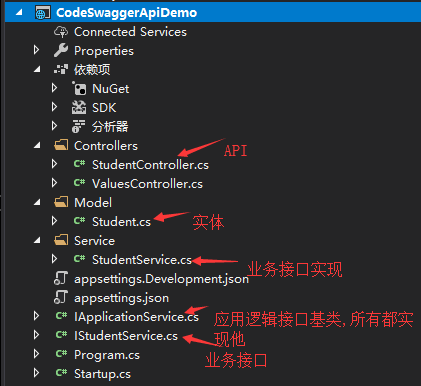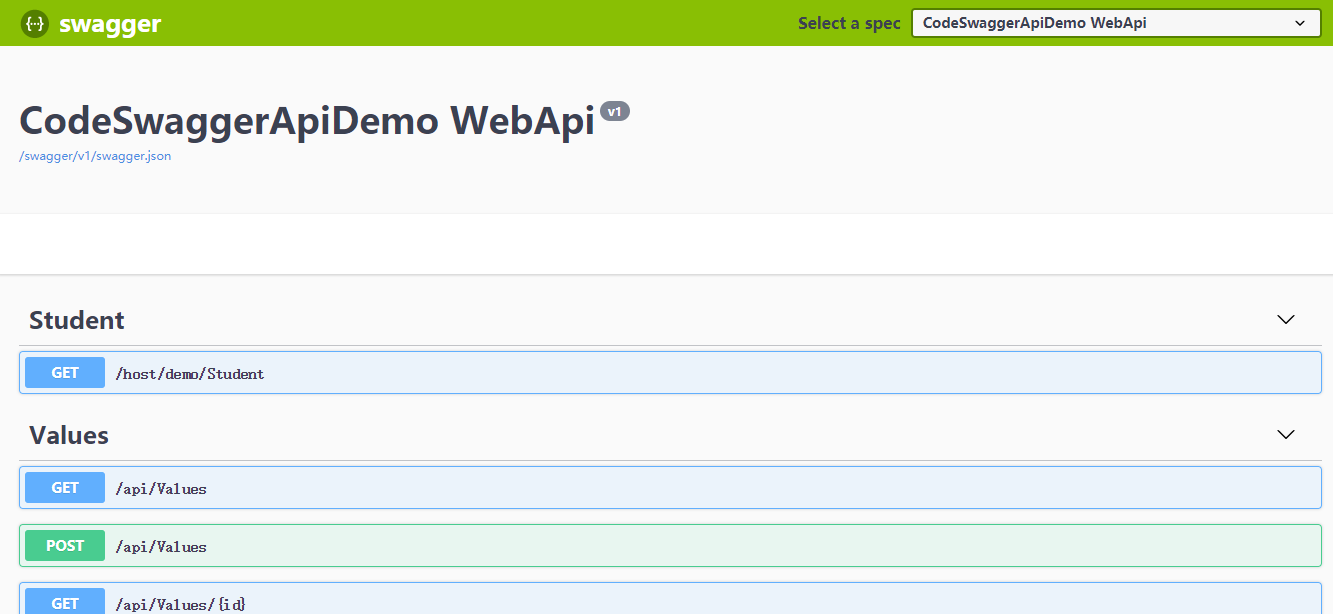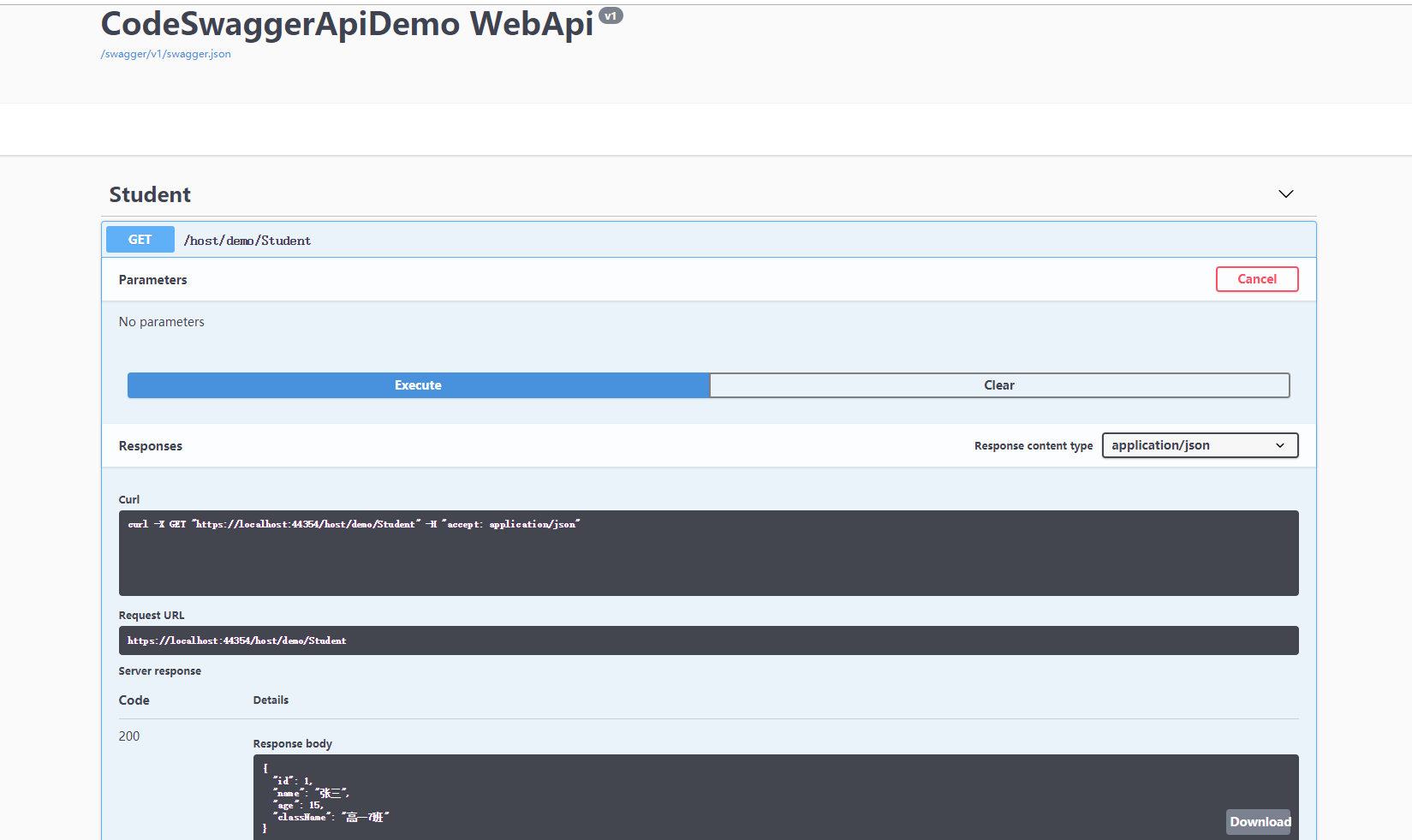.net core webApi之文档描述Swagger
前面和几位同事在做项目的时候用了前后端分离模式,前端用react,后端才用webApi接口的形式进行交互,但是在开发过程中,发现由于业务逻辑很多,导致有着几百个大量的接口需要提供接口说明文档,可以想象是一个多大的工作量,当时同事就搭建了接口说明描述插件Swagger来解决了这个问题。由于工作的原因一直没有自己实践,,恰好这两天又在群里面看到"晓晨Master的Swagger文章(https://www.cnblogs.com/stulzq/p/11007770.html)",就想着自己实践一下,按照自己的理解做一个学习记录。
一、对Swagger的理解
1、 什么是Swagger
目前的理解来看,就是接口说明描述文档。
2、Swagger的好处
1、节省了自己去写接口说明的工作量,并且描述更加清晰,易于调用接口方理解和使用。
2、接口可以直接调试、测试,及时返回接口接口,排查问题
二、配置使用
1、创建项目,这里只是为了配置简单得Swagger,并没有按照实际项目中去分应用层、逻辑层。。。。。来创建项目。

2、添加Swagger插件到项目中,可以使用"程序包管理器控制台",根据自己的需要,可以搜索插件版本进行安装。
Install-Package Swashbuckle.AspNetCore -Version 4.0.1
3、IApplicationService.cs 应用接口逻辑基类
DynamicWebApi是实现动态API的特性,需要安装Install-Package Panda.DynamicWebApi,此实例中并没有实际用到。
[DynamicWebApi]
public interface IApplicationService : IDynamicWebApi
{
}
4、Model->Student.cs实体

1 public class Student 2 { 3 4 public int ID { get; set; } 5 public string name { get; set; } 6 7 public int age { get; set; } 8 9 public string ClassName { get; set; } 10 } 11 }
5、IStudentService.cs,业务接口

1 public interface IStudentService : IApplicationService 2 { 3 /// <summary> 4 /// 根据ID获取学生 5 /// </summary> 6 /// <param name="id"></param> 7 /// <returns></returns> 8 Student GetStudentById(int id); 9 }
6、StudentService.cs,实现业务逻辑接口

1 public class StudentService : IStudentService 2 { 3 [HttpGet("{id:int}")] 4 public Student GetStudentById(int id) 5 { 6 return new Student() { ID = 1, age = 15, ClassName = "高一7班", name = "张三" }; 7 } 8 }
7、StudentController,应用层接口

1 public static IStudentService _studentService; 2 public StudentController(IStudentService service) 3 { 4 _studentService = service; 5 } 6 [HttpGet] 7 public object Get() 8 { 9 return _studentService.GetStudentById(1); 10 }
8、Startup配置

1 public class Startup 2 { 3 public Startup(IConfiguration configuration) 4 { 5 Configuration = configuration; 6 } 7 8 public IConfiguration Configuration { get; } 9 10 // This method gets called by the runtime. Use this method to add services to the container. 11 public void ConfigureServices(IServiceCollection services) 12 { 13 services.AddMvc().SetCompatibilityVersion(CompatibilityVersion.Version_2_2); 14 services.AddScoped<IStudentService, StudentService>();//注入接口 15 var basePath = AppContext.BaseDirectory; 16 var xmlPath = System.IO.Path.Combine(basePath, "CodeSwaggerApiDemo.xml");//Swagger接口说明文件,里面会包含接口说明和参数说明 17 //添加Swagger配置 18 services.AddSwaggerGen(c => 19 { 20 c.SwaggerDoc("v1", new Info { Title = "CodeSwaggerApiDemo WebApi", Version = "v1" }); 21 c.DocInclusionPredicate((docName, description) => true); 22 if (System.IO.File.Exists(xmlPath)) c.IncludeXmlComments(xmlPath); 23 24 }); 25 } 26 27 // This method gets called by the runtime. Use this method to configure the HTTP request pipeline. 28 public void Configure(IApplicationBuilder app, IHostingEnvironment env) 29 { 30 if (env.IsDevelopment()) 31 { 32 app.UseDeveloperExceptionPage(); 33 } 34 else 35 { 36 // The default HSTS value is 30 days. You may want to change this for production scenarios, see https://aka.ms/aspnetcore-hsts. 37 app.UseHsts(); 38 } 39 40 app.UseHttpsRedirection(); 41 //添加配置,.json如果遇到运行报错,直接运行..../swagger.json可查看详细的错误信息 42 app.UseMvc(); 43 app.UseSwagger(); 44 app.UseSwaggerUI(c => 45 { 46 c.SwaggerEndpoint("/swagger/v1/swagger.json", "CodeSwaggerApiDemo WebApi"); 47 }); 48 } 49 }
9、运行结果(xxxxxx/swagger/index.html)
列出接口目录

调用接口结果

以上就是本人对Swagger的理解和记录,如果有问题的地方烦请大佬指出,万分感谢!



